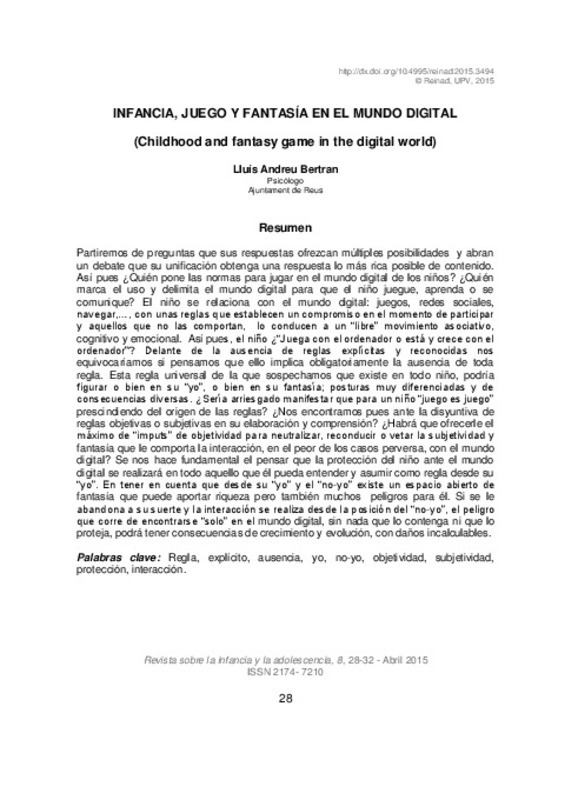JavaScript is disabled for your browser. Some features of this site may not work without it.
Buscar en RiuNet
Listar
Mi cuenta
Estadísticas
Ayuda RiuNet
Admin. UPV
Infancia, juego y fantasía en el mundo digital
Mostrar el registro sencillo del ítem
Ficheros en el ítem
| dc.contributor.author | Andreu Bertran, Lluís
|
es_ES |
| dc.date.accessioned | 2016-11-14T12:51:50Z | |
| dc.date.available | 2016-11-14T12:51:50Z | |
| dc.date.issued | 2015-04-27 | |
| dc.identifier.uri | http://hdl.handle.net/10251/73952 | |
| dc.description.abstract | [EN] We begin with questions that offer multiple answers and open a debate which will give a more complete answer with richer content when possible. Who sets the rules to play in the Children’s digital world? Who sets the limits of this digital world for a child to play learn or communicate? The child interacts with the digital world: games, social networks, web surfing,... with rules that establish a commitment with those who do not agree with them, they lead to a "free" associative, cognitive and emotional movement. Thereby, does the child play with computers or does he grow up with them? Since there are no explicit rules we would be wrong to think that this implies the absence of any mandatory rule. This universal rule which we believe to exist in every child, could be included either in its "Self" or in his fantasy in very distinct ways and different consequences. Would it be risky to state that for a child "to play is to play" regardless of origin of the rules? Are we therefore facing the dilemma of objective and subjective rules in their development and understanding? Should we offer them as many objectivity inputs as possible in order to neutralize, redirect or ban the subjectivity and fantasy the interaction involves with the digital world, which can be even perverse in the worst case scenario? It is essential for us to think that the child’s protection towards the digital world will happen in all the situations where he can understand and assume as a rule from his "Self". We have to take on count that from his "Self” and his "Not-Self" there is a fantasy open space that can bring wealth but also a lot of danger for him. If he is abandoned to his fate and the interaction is performed from the position of "Not-Self", the danger of being alone in the digital world with nothing protects him, can have consequences during his development with incalculable damages. | es_ES |
| dc.description.abstract | [ES] Partiremos de preguntas que sus respuestas ofrezcan múltiples posibilidades y abran un debate que su unificación obtenga una respuesta lo más rica posible de contenido. Así pues ¿Quien pone las normas para jugar en el mundo digital de los niños? ¿Quien marca el uso y delimita el mundo digital para que el niño juegue, aprenda o se comunique? El niño se relaciona con el mundo digital: juegos, redes sociales, navegar,…, con unas reglas que establecen un compromiso en el momento de participar y aquellos que no las comportan, lo conducen a un “libre” movimiento asociativo, cognitivo y emocional. Así pues, el niño ¿“Juega con el ordenador o está y crece con el ordenador”? Delante de la ausencia de reglas explícitas y reconocidas nos equivocaríamos si pensamos que ello implica obligatoriamente la ausencia de toda regla. Esta regla universal de la que sospechamos que existe en todo niño, podría figurar o bien en su “yo”, o bien en su fantasía; posturas muy diferenciadas y de consecuencias diversas. ¿Seria arriesgado manifestar que para un niño “juego es juego” prescindiendo del origen de las reglas? ¿Nos encontramos pues ante la disyuntiva de reglas objetivas o subjetivas en su elaboración y comprensión? ¿Habrá que ofrecerle el máximo de “imputs” de objetividad para neutralizar, reconducir o vetar la subjetividad y fantasía que le comporta la interacción, en el peor de los casos perversa, con el mundo digital? Se nos hace fundamental el pensar que la protección del niño ante el mundo digital se realizará en todo aquello que él pueda entender y asumir como regla desde su “yo”. En tener en cuenta que desde su “yo” y el “no-yo” existe un espacio abierto de fantasía que puede aportar riqueza pero también muchos peligros para él. Si se le abandona a su suerte y la interacción se realiza desde la posición del “no-yo”, el peligro que corre de encontrarse “solo” en el mundo digital, sin nada que lo contenga ni que lo proteja, podrá tener consecuencias de crecimiento y evolución, con daños incalculables | es_ES |
| dc.language | Español | es_ES |
| dc.publisher | Universitat Politècnica de València | |
| dc.relation.ispartof | Revista sobre la infancia y la adolescencia | |
| dc.rights | Reconocimiento - No comercial - Sin obra derivada (by-nc-nd) | es_ES |
| dc.subject | Interacción | es_ES |
| dc.subject | Videojuegos | es_ES |
| dc.subject | Protección | es_ES |
| dc.subject | Psicología | es_ES |
| dc.subject | Personalidad | es_ES |
| dc.subject | Subjetividad | es_ES |
| dc.title | Infancia, juego y fantasía en el mundo digital | es_ES |
| dc.title.alternative | Childhood and fantasy game in the digital world | es_ES |
| dc.type | Artículo | es_ES |
| dc.date.updated | 2016-11-14T12:41:34Z | |
| dc.identifier.doi | 10.4995/reinad.2015.3494 | |
| dc.rights.accessRights | Abierto | es_ES |
| dc.description.bibliographicCitation | Andreu Bertran, L. (2015). Infancia, juego y fantasía en el mundo digital. Revista sobre la infancia y la adolescencia. (8):28-32. https://doi.org/10.4995/reinad.2015.3494 | es_ES |
| dc.description.accrualMethod | SWORD | es_ES |
| dc.relation.publisherversion | https://doi.org/10.4995/reinad.2015.3494 | es_ES |
| dc.description.upvformatpinicio | 28 | es_ES |
| dc.description.upvformatpfin | 32 | es_ES |
| dc.type.version | info:eu-repo/semantics/publishedVersion | es_ES |
| dc.description.issue | 8 | |
| dc.identifier.eissn | 2174-7210 | |
| dc.description.references | PIAGET, Jean. Psicología del ni-o. Morata. 1969 | es_ES |








